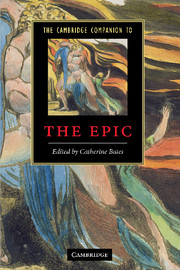Book contents
- Frontmatter
- 1 The Epic of Gilgamesh
- 2 Greek epic
- 3 Roman epic
- 4 Heroic epic poetry in the Middle Ages
- 5 Dante and the epic of transcendence
- 6 Italian Renaissance epic
- 7 Camões’s Os Lusíadas: the first modern epic
- 8 The Faerie Queene: Britain’s national monument
- 9 The seventeenth-century Protestant English epic
- 10 Mock-heroic and English poetry
- 11 Romantic re-appropriations of the epic
- 12 Ezra Pound, T.S. Eliot, and the modern epic
- 13 Derek Walcott’s Omeros
- 14 Epic in translation
- Guide to further reading
- Index
14 - Epic in translation
Published online by Cambridge University Press: 28 May 2010
- Frontmatter
- 1 The Epic of Gilgamesh
- 2 Greek epic
- 3 Roman epic
- 4 Heroic epic poetry in the Middle Ages
- 5 Dante and the epic of transcendence
- 6 Italian Renaissance epic
- 7 Camões’s Os Lusíadas: the first modern epic
- 8 The Faerie Queene: Britain’s national monument
- 9 The seventeenth-century Protestant English epic
- 10 Mock-heroic and English poetry
- 11 Romantic re-appropriations of the epic
- 12 Ezra Pound, T.S. Eliot, and the modern epic
- 13 Derek Walcott’s Omeros
- 14 Epic in translation
- Guide to further reading
- Index
Summary
Like so many other terms associated with epic, the term 'translation' itself presents varied facets, leading to questions of definition. In its most obvious sense, there is the long sequence of English renderings of epics, presenting their own form of literary history. Then, from the perspective of two and more millennia, we can see that a main characteristic of the original epics is the ability to generate successors. They translate their predecessors in the sense of carrying them forward into new territories. Not only do we recognize influences and lines of descent from epic into other genres (lyric, theatre, novel, opera), but almost without exception both major and minor practitioners of epic have themselves operated with an unusual sense of their ancestors, an acknowledged pietas. This has not only been true of the long line of literary, or secondary, epics. It was true also for the performers of the primary epics, most of whom looked back from their own 'dark' ages to a heroic period many hundreds of years earlier when the tales had originated, at the start of an oral transmission spanning many generations of bards. Those who transmitted the Iliad, Odyssey, Aeneid, Beowulf, and Mahabharata were both literally and figuratively singing to an Iron Age audience the lays of a lost Bronze Age, with behind it the even more shadowy myths of a Golden Age. Their poems were symbolized in the golden bough, 'so long unseen', that served to unlock a buried past.
- Type
- Chapter
- Information
- The Cambridge Companion to the Epic , pp. 246 - 263Publisher: Cambridge University PressPrint publication year: 2010
- 1
- Cited by



